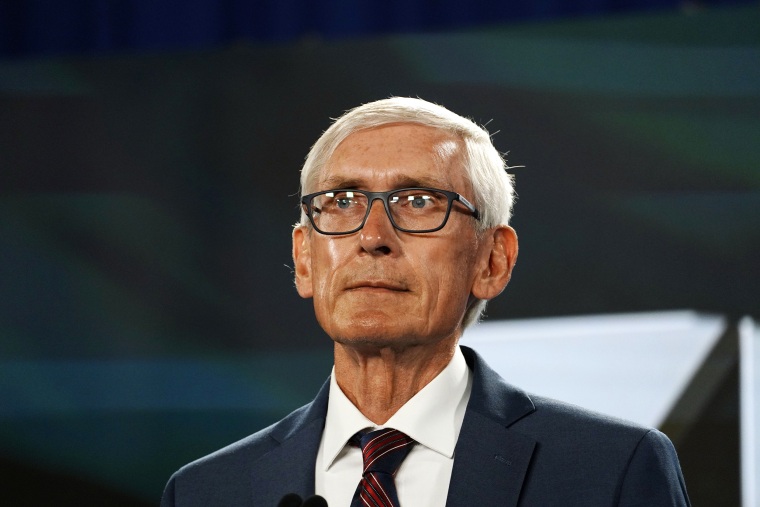Wisconsin Gov. Tony Evers, a Democrat, vowed over the weekend to grant clemency to anyone charged under the state’s 1849 law banning most abortions.
That law, enacted more than a century before Roe v. Wade, has remained on the books in the state and has technically retaken effect following the Supreme Court ruling Friday overturning the landmark case.
Evers, Wisconsin Democratic Attorney General Josh Kaul and several county district attorneys in the state have said they would refuse to enforce it, but it remains possible that other officials — such as other district attorneys and newly elected state lawmakers — could enforce it now or in the future. Evers and Kaul are both up for re-election this fall, and both are facing tough races.
But at a rally during Wisconsin’s state Democratic Party convention Saturday, Evers went even further, saying that in addition to taking steps to not enforce the law, he would grant clemency to doctors prosecuted under the law.
“The 1849 law says that anybody that provides an abortion is subject to a felony, one to six years,” Evers said. “Did you ever think about the word clemency? I will provide clemency to any physician that is charged under that law,” he said.
“I don’t think that a law that was written before the Civil War, or before women secured the right to vote, should be used to dictate these intimate decisions on reproductive health,” he added.
Evers called the Supreme Court decision “bulls---” and warned that abortion access would be even more at risk if one of his Republican opponents were to prevail in November. The four leading candidates running — former Lt. Gov Rebecca Kleefisch, businessman Tim Michels, state Rep. Tim Ramthun and businessman Kevin Nicholson — are all outspoken opponents of abortion and have said they’d keep the 1849 law intact.
“You think it’s bad now? The four Republicans that are going after me, one of them we’re going to beat, they are going to make it worse," Evers said.
His remarks were first reported by the Milwaukee Journal Sentinel.
Evers’ comment further underscores the freshly crucial role that abortion rights will play in close statewide contests in Wisconsin and elsewhere.
In Wisconsin, the candidate of the sitting president’s political party has lost the last seven gubernatorial races — all of which occurred in midterm years. Most recently, in 2018, Evers eked out a victory against then-Republican Gov. Scott Walker by fewer than 30,000 votes amid a broader blue wave that also handed Democrats the House of Representatives.
Evers is one of several vulnerable Democratic governors in purple states across the U.S., where abortion rights have taken on increased importance in campaigns. The nonpartisan Cook Political Report has rated Evers’ race a toss-up.
Wisconsin’s 1849 law bans abortions in almost all cases. The law would make performing an abortion a felony, with doctors who perform the procedure facing up to six years in prison and thousands of dollars in fines. The law makes an exception only to save the life of the woman — but not for her health or for rape or incest.
Planned Parenthood’s Wisconsin operations have suspended abortion services in the state in response to the Supreme Court decision.
State lawmakers have the ability to repeal or amend the law, or pass new superseding legislation, but the state’s Republican-controlled Legislature — which is all but certain to remain in GOP hands after November — is unlikely to do so. At a special legislative session Evers convened last week in an effort to change the law, Republicans adjourned the meeting almost immediately after it began.
Abortion rights emerged as a top issue in governor races in Pennsylvania, Michigan and Nevada, among others, as well, even before Friday’s ruling.
In Pennsylvania, Democratic nominee Josh Shapiro has highlighted GOP rival Doug Mastriano’s support for outlawing all abortion, including in cases of rape and incest, decrying him as too extreme for the commonwealth.
Michigan, similar to Wisconsin, has on the books a 1931 law that calls for up to four years of prison time for doctors who perform abortions — and possibly for women who take medication to induce an abortion. Democratic Gov. Gretchen Whitmer filed a lawsuit in April urging her state’s Supreme Court to determine whether the Michigan Constitution protects the right to abortion.

